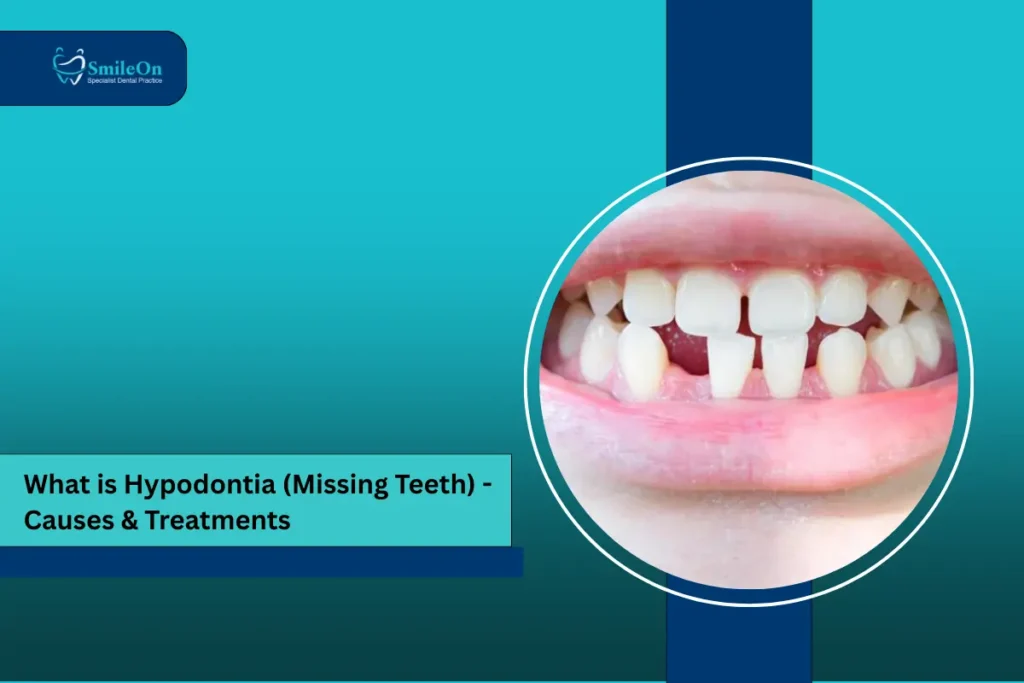Hypodontia happens when it is the failure to develop one or more teeth in the jaw. It is also quite frequent, and happens in 2-8% of the world’s population. However, the condition can go from mild to severe and causes multiple issues.
Hypodontia is a dental condition where a patient lacks one or more teeth, apart from the third molars, more commonly referred to as the wisdom teeth.
Table of Contents
ToggleWhat is Hypodontia?
It may sound unimportant when people have one or two missing teeth; however, hypodontia has different effects on the oral cavity, face, and well-being.
Symptoms of Hypodontia
Depending on the degree, missing teeth can be easily diagnosed, or they can be masked by the opposing teeth or by a partially broken tooth. These are some signs you should look for:
- Spaces in the Gums: It is often for this reason that parents may first become aware that hypodontia may be present as part of their child’s dental formation process. Later, when the child got full teeth, parents notice the gap.
- Misaligned teeth: The displacement of teeth happens when the gaps from missing teeth lead to shifting of neighboring teeth, resulting in an irregular bite.
- Speech Issues: Also, a lisp or an inability to pronounce a certain word or phrase properly can be caused by missing teeth. Especially in case, if the particular teeth are used to pronounce the sounds of speech.
- Visual Concerns: Besides functional problems, facial beauty problems such as gaps or misalignment due to the absence of teeth lower a person’s self-esteem.
- Chewing Difficulties: Missing teeth may cause embarrassment when chewing sound foods, which in turn has an implication on common health.
Causes of Missing Teeth
The causes associated with hypodontia may range from simple genetics to being multifactorial. Some of the factors that can be linked with these successes are:
- Genetic Factors: If either of the parents or another close family member has had problems with the teeth, the problem can come in hereditary.
- Environmental Influences: One of the reasons is that you take certain medicines at the time of tooth formation.
- Syndromes and Disorders: It is often related to ectodermal dysplasia, Down syndrome, and cleft lip or palate.
- Prenatal Factors: The particular infection or any other mishandling in nutrition can cause Hypodontia in the fetal development.
Best Possible Treatment Options
These are many dental therapies that you can consider to improve the function and appearance of your mouth and teeth.
Space Maintenance:
In children and adolescents, there is tremendous importance of having space available for the permanent teeth. For example, these are devices you can use to make sure other teeth do not shift in the space left by missing teeth.
Orthodontic Treatment:
Missing teeth may also be a reason one could need orthodontic braces or an aligner to have the gum line straightened. SmileOn – the most reliable dental clinic can put the mouth in position for more complex restorative procedures by positioning the remaining teeth correctly.
Dental Implants:
Teeth implants are now considered a long-lasting method of tooth replacement among the population that needs dental interventions. They are titanium screw-like structures that are anchored to the jawbone where the crowns for natural teeth are to be installed.
Dental Bridges
There are other types of dental bridges for replacement of lost teeth. In a dental bridge, the crown supports the artificial tooth which the dentist uses in place of the missing tooth.
Veneers
Dental veneer is a thin layer of porcelain material that is placed over the front aspect of teeth. They can cover the spaces between the teeth or even overlapping teeth and do so with minimal recontouring of the tooth structure.
FAQs
Is hypodontia a birth defect?
Yes, hypodontia is a form of birth defect, thus essentially fitting their definition of the term. It arises from improper growth of teeth during the prenatal period. However, genes also cause this dental condition.
How does hypodontia affect my oral health?
The consequences that result from hypodontia are myriad if the condition is not properly managed. These include:
- Chewing Difficulties: This makes it difficult to chew food, may lead to digestion problems, or even severe diseases.
- Speech Impairment: Congenital absence of teeth, especially the anterior ones, may decrease the chances of speaking clearly.
Is hypodontia hereditary?
Yes, hypodontia can be hereditary. This condition is hereditary which means that it runs in your family and generations. It is always important to let your dentist know if you have hypodontia in your family history, since they can closely monitor it or even start treatment if needed.
Final Thoughts
Hence, this condition has a strong effect on overall oral health. However, when you know the right cause and treatment you can better handle this issue.
Above are different treatment options, that can help you get the best confident smile with a shiny set of teeth. Plus, the treatment can also help improve the functions of your mouth such as speech, chewing, and eating.
If you have missing teeth, contact SmileOn. We can help determine the severity of your case as well as a treatment plan that might best suit you.


